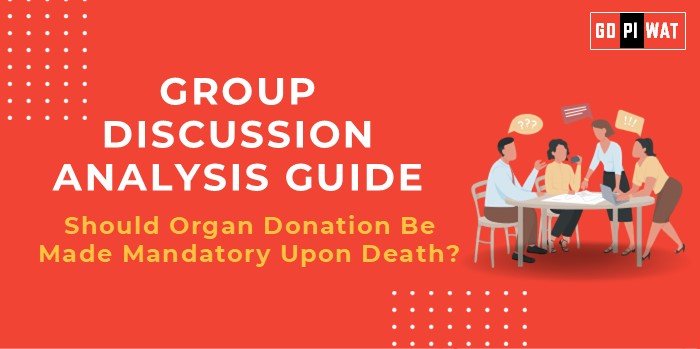📋 Group Discussion (GD) Analysis Guide: Should Organ Donation Be Made Mandatory Upon Death?
🌟 Introduction to the Topic
- Opening Context: “Organ donation can save countless lives, yet the gap between demand and supply remains significant. Many nations face a shortage of donors, leading to preventable deaths annually.”
- Topic Background: Organ donation involves giving consent to donate organs after death to those in need. While voluntary systems dominate globally, some countries have adopted mandatory or opt-out policies to address shortages. The debate around mandatory organ donation touches on ethics, autonomy, and societal benefit.
📊 Quick Facts and Key Statistics
- 🌍 Organ Transplants Needed Globally: Over 1 million annually, with demand far exceeding supply.
- 📉 India’s Organ Donation Rate: 0.86 per million population (2023) – significantly lower than Spain’s 46.9 per million.
- ⚠️ Waiting List Deaths: Approximately 10 people die daily in India waiting for transplants.
- ✅ Consent Models: Opt-out policies (e.g., Spain, Austria) show higher donation rates compared to opt-in systems (e.g., India, USA).
🔗 Stakeholders and Their Roles
- 🏛️ Governments: Legislate and regulate organ donation frameworks.
- 🩺 Medical Community: Facilitate transplants, ensure ethical practices, and manage donor-recipient databases.
- 📢 NGOs and Advocacy Groups: Raise awareness and encourage donations.
- 👥 Citizens: Consent and participate in the donation system.
🏆 Achievements and Challenges
✨ Achievements:
- 🌟 Global Success Stories: Spain’s opt-out model has created the highest donor rate worldwide.
- 🛠️ Technological Advancements: Innovations like 3D bioprinting and organ preservation have improved transplant outcomes.
⚠️ Challenges:
- 📜 Cultural and Religious Barriers: In many societies, cultural beliefs discourage organ donation.
- ⚖️ Ethical Concerns: Mandating donation can be perceived as infringing on personal autonomy.
- 🏗️ Logistical Issues: Inefficient organ matching systems and lack of healthcare infrastructure hinder implementation in developing countries.
Global Comparisons: Countries like Spain and Austria lead with robust organ donation systems, while opt-in systems in the US and India struggle with low donation rates.
Case Study: Tamil Nadu, India: State-level efforts with streamlined organ allocation systems have achieved the highest donation rates in the country.
💡 Structured Arguments for Discussion
- Supporting Stance: “Mandatory organ donation ensures equitable access to life-saving transplants, addressing the chronic donor shortage.”
- Opposing Stance: “Forcing individuals to donate organs violates personal and religious freedoms, raising ethical concerns.”
- Balanced Perspective: “While mandatory organ donation can save lives, policies must respect cultural diversity and provide opt-out options.”
🎯 Effective Discussion Approaches
- Opening Approaches:
- 📊 Statistical Impact: “With over a million lives at stake annually, organ shortages demand urgent systemic changes.”
- 🔍 Contrast Opening: “While Spain boasts a donor rate of 46.9 per million, India struggles at less than 1 per million.”
- 📖 Case Study Introduction: “Tamil Nadu’s success in organ donation demonstrates the potential of localized solutions.”
- Counter-Argument Handling:
- ⚖️ Emphasize autonomy and ethics while suggesting opt-out clauses for inclusivity.
- 🌟 Highlight global success stories to counter skepticism about implementation.
📈 Strategic Analysis of Strengths and Weaknesses
- 💪 Strengths: Saves lives, reduces transplant waiting lists, promotes societal responsibility and altruism.
- 🛑 Weaknesses: Ethical dilemmas, resistance from religious groups, administrative challenges.
- 🌟 Opportunities: Develop global best practices for donation frameworks, improve public health infrastructure.
- ⚡ Threats: Public mistrust in healthcare systems, cultural backlash against perceived coercion.
🎓 Connecting with B-School Applications
- 📌 Real-World Applications: Explore healthcare management strategies and ethical decision-making in public policy.
- 🧐 Sample Interview Questions:
- 💬 “What are the pros and cons of mandatory organ donation?”
- 📢 “How can public awareness campaigns improve organ donation rates?”
- 💡 Insights for B-School Students: Focus on policy innovation, cross-sector collaboration, and addressing ethical dilemmas in healthcare.


